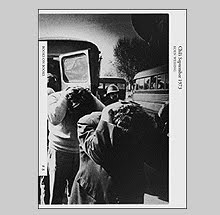A new book and documentary on Miroslav Tichy
The other day while browsing through the bookshop of the
I have written about Miroslav Tichy before so for those of you that need some background on his work I would refer you to my other article here at 5B4. That being said, Tichy is still much of a mystery in terms of the facts of his life and background. Immediately after my first posting I received a flurry of e-mails stating that much of what is written about Mr. Tichy (including much of what I wrote) is factually incorrect. The texts in this book repeat many of the same stories about Tichy being subjected to imprisonments and prolonged stays in mental hospitals due to his outsider stance towards society. The writer is Roman Buxbaum who claims to have spent much time with Tichy and whose father was Tichy's doctor. Buxbaum is also one of the main parties behind
The first thing you notice about this book is the design and the materials used in its construction. Like Tichy's handmade cameras and improvised photographic technique this book reflects a similar handmade quality by using raw uncovered book board that seems like material that Tichy himself would frame his pictures with. Once you open the cover you're faced with exquisite blue and papers (that match the color of the title silk-screened onto the cover) and three signatures worth of heavy matte paper which contain a prelude of photographs of the artists at work followed by the Buxbaum text called Tarzan Retired.
The middle of the book is approximately 96 pages of photographs and quotes from Tichy. For these pages the designer has reverted to a nice Japanese art paper, common to quality photo and art books. The final three signatures provide Japanese translations of the texts plus a biography and bibliography as well as a list of the reproductions.
The photos of themselves are a wonderful edit of Tichy's imaginative and dreamlike city of women. In varying degrees of sharpness his female protagonists are shown sun bathing or simply walking in the street but all are reduced to basic forms and essence. The photographs are presented as objects with their rough edges, creases and tears and the occasional improvised over-matting decorated by Tichy's hand.
There is nothing about this book that I do not enjoy. From the exposed book-binders tape that covers the spine, to the wraparound dust jacket that only covers two thirds of the book, to the squareness of the neatly trimmed cover boards and book block -- this is a prime example of an extremely well thought-out and executed book object. I certainly wish there were more made like this.
As Tichy is a man with a very interesting past life who is now in his eighties and facing fame as an outsider artist, he of course would be the great subject for a documentary film. Luckily a director as sensitive to her subject as Natasa von Kopp came along first to create a portrait of the man before anyone else. Worldstar directed by Natasa von Kopp and distributed by Kloos & Co out of
Worldstar is a portrait of Tichy living in the
Although this film is not scathing in terms of condemning Buxbaum for his efforts to bring attention to Tichy, he does come off as somewhat of an opportunist who has loads of Tichy's work and whose best interest is with hyping the value of his archive than with Tichy as a human being. There is one scene, with Tichy slumped in his chair while Roman and others paw through stacks of photographs, that the cinematographer Beate Scherer frames with such claustrophobic results that it seems more like a mugging is taking place. This is compounded by the fact that at no point in the documentary is it clear if Tichy is being paid for the work or if he is at least being paid well.
Tichy in other ways is a hard nut to crack and thus a difficult portrait to paint. He makes blanket statements about life that seem too dismissive to be believable along the lines of the above quote about enjoyment and then he sits clearly fond of the moments when his neighbor (who has a watchful eye towards the motives of Tichy's visitors) comes to visit.
Worldstar is a beautifully shot and edited film (real film too) that at times seems to channel Tichy's own alternative techniques of soft focus and graininess to great effect. Tichy seems fond of the two filmmakers but at one moment he calls into question what all of the fuss is about when he asks, "Why does she film me? I am not moving. There is nothing here to film." Again calling into question if the film-makers good intentions really matter or if it is all different levels of harassment.
To be fair, film is as manipulative as any other medium. Moments of truth captured on film can be edited any number of ways to create vast distortions and untruths. Whether Tichy is being taken advantage of is still difficult to determine. I hope he isn't. Because much of what is implied would be difficult to bear and it doesn't end with greedy dealers and collectors -- it extends to the books and ultimately us as well.
















